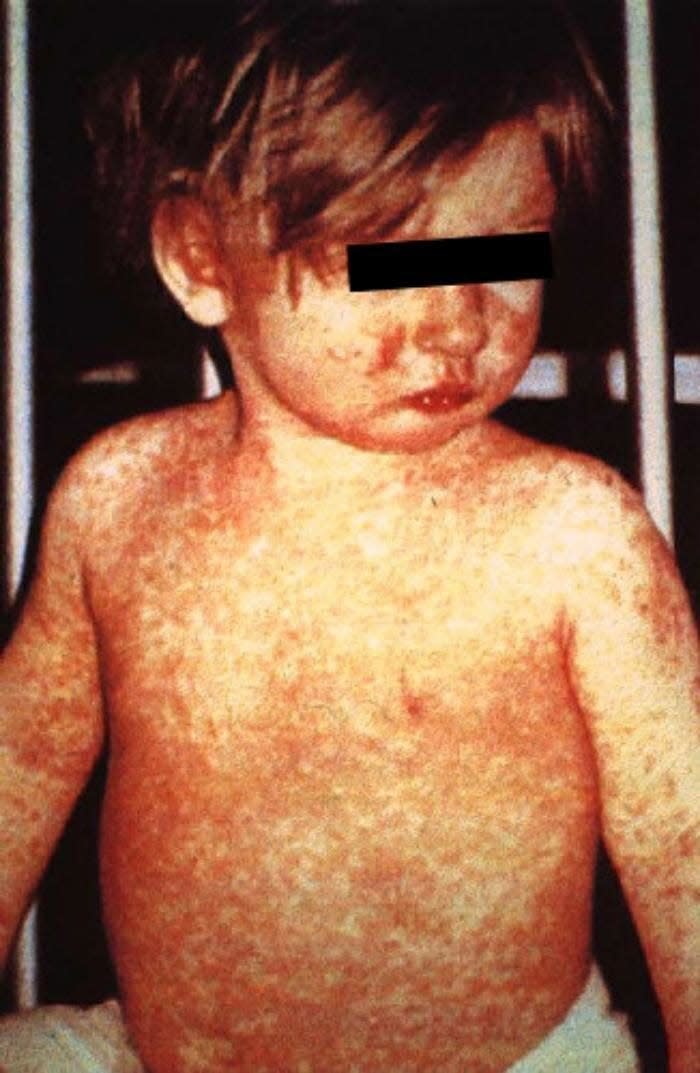What is measles and how serious is it? What to know about the infection that causes a rash
Measles is a highly contagious viral infection that is often recognized by a red rash that appears all over the body.
It is particularly dangerous for children under 5 and babies, and the infection can lead to pneumonia and swelling of the brain. As many as one in 20 children who get measles get pneumonia, which is the leading cause of death for children who contract the infection.
Luckily, measles is almost entirely preventable by receiving the MMR vaccine. MMR stands for measles, mumps and rubella and is administered in a series of two injections during childhood.
More: Four measles cases reported in Broward County school. What about Palm Beach County?
Here's what to know about measles, how it spreads and what to do if you notice symptoms:
What is measles?
Measles is a viral infection that usually causes a high fever, cough, runny nose and watery eyes between seven and 14 days after the person comes in contact with the virus.
Three to five days after symptoms begin, a rash usually breaks out. It often begins as flat red spots that appear on the face at the hairline and spread downward to the neck, trunk, arms, legs, and feet, according to the CDC.
When the rash appears, a person’s fever may spike to more than 104°.
How is measles spread?
Measles spreads through the air when an infected person coughs or sneezes.
It is so contagious that if one person has it, up to nine out of 10 people around that person will also become infected if they are not vaccinated, according to the CDC.

How serious is measles?
Measles is especially dangerous for children under 5, babies, pregnant people or people with HIV.
About one in five people who get the infection and are unvaccinated for measles are hospitalized, according to the CDC.
Severe complications from measles include pneumonia, swelling of the brain (encephalitis), pregnancy complications and death.
As many as one out of every 20 children with measles gets pneumonia, the most common cause of death from measles in young children, per the CDC.
Is there a vaccine for measles?
Measles is completely preventable if a child receives the MMR vaccine.
The vaccine protects against three diseases: measles, mumps and rubella. The CDC recommends children get two doses of MMR vaccine, starting with the first dose when they are 12 to 15 months old, and the second dose between 4 and 6 years old.
What percentage of U.S. children are vaccinated for measles?
The national vaccination rate for measles is more than 90%.
Data from 2021 show that 90.8% of children born in 2016 were vaccinated against measles, mumps and rubella by the time they were 2.
Data from 2019 show the vaccination rate for teenagers born from 2002 to 2006 was slightly higher at 91.9%.
In Florida, CBS News reported that 91.7% of kindergarteners were vaccinated for measles.
Measles still considered 'eliminated' virus in the U.S.
Measles has been considered an "eliminated" virus in the United States since 2000.
The World Health Organization classifies a virus as eliminated from a country after there is no transmission within that country for at least 12 months. Elimination is different from eradication, which means a disease or virus has been wiped out worldwide.
"While we expect importations of measles cases into the United States to continue, the risk for measles for the majority of the population would still remain low. That is because most people in the United States are vaccinated against measles," the CDC website says.
Can you get measles if you're vaccinated?
Those that have received the full series of the MMR immunization are 98% protected and are highly unlikely to contract measles, according to the Florida Department of Health.
What to do if your child shows symptoms of measles
If you suspect or notice any symptoms of measles, contact your health care provider to receive instructions on how to safely seek medical attention without exposing other patients.
Do not abruptly visit the Health Department or your health care provider without contacting them ahead of time.
Katherine Kokal is a journalist covering education at The Palm Beach Post. You can reach her at kkokal@pbpost.com. Help support our work, subscribe today!
This article originally appeared on Palm Beach Post: What is measles? Symptoms, measles vaccine and red rash
